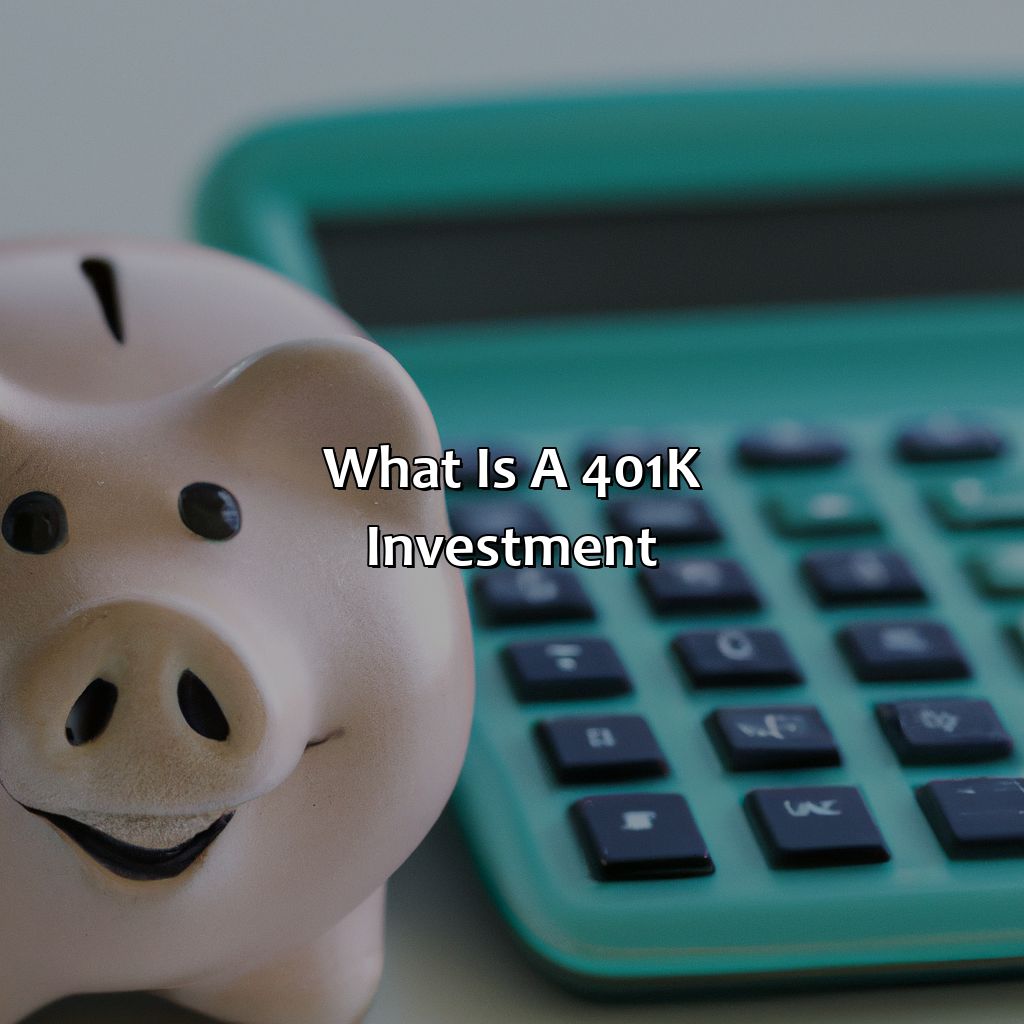What Is A 401K Investment?
Key Takeaway:
- A 401k investment is a retirement savings plan that allows employees to contribute a portion of their pre-tax income into an investment account, with the goal of building a nest egg for retirement.
- 401k investment plans offer several benefits, including employer contributions, tax advantages, and investment growth through compound interest. There are also different types of 401k investments, such as traditional, Roth, and safe harbor.
- Effective management of your 401k investment includes setting investment goals, diversifying your investments, and regularly monitoring and adjusting your investment strategy. It is important to be aware of early withdrawal penalties and required minimum distributions to avoid costly mistakes.
Are you looking to maximize your retirement savings? 401k investments provide an opportunity to save more for your golden years. You can get the most out of your 401k with the right strategy. Learn more about how to maximize your 401k investment.
What is a 401k investment?
A 401k investment is a retirement savings plan that allows employees to contribute a portion of their income towards retirement. The employee decides how much to contribute, and the employer may match a portion of the employee’s contribution. The investment grows tax-free until retirement, and the employee can choose how to invest the funds among various options typically provided by the employer.
Investing in a 401k plan can be a smart way to save for retirement as it offers tax benefits and the potential for compounded returns over time. However, there are limits to how much can be contributed each year, and there may be fees and penalties for early withdrawals. It’s important to understand the benefits and limitations of a 401k plan and to start contributing as early as possible to maximize potential retirement savings.
Beyond contributing regularly to a 401k plan, it’s important to regularly check on the account and adjust investments as needed based on changing financial goals and market conditions. With proper planning and management, a 401k investment can provide a solid foundation for a comfortable retirement.
Don’t miss out on the opportunity to secure your financial future with a 401k investment. Start contributing today, and regularly review and adjust your investments to ensure long-term success.

Image credits: retiregenz.com by James Washington
Benefits of a 401k investment
The 401k investment plan is a great way to manage your retirement fund while enjoying tax benefits. It’s a retirement savings account sponsored by an employer. The money is deducted from your pre-tax income and invested in mutual funds, stocks, or bonds.
- Pre-tax contributions, which means lower taxable income and higher savings for retirement.
- Tax-deferred growth, means your investment grows tax-free for years until withdrawal in retirement.
- Employer match, some employers match a percentage of your contributions, contributing to your retirement plan.
Investing in a 401k plan also provides flexibility to choose your investment strategy and adjust your contributions for long-term growth.
The 401k plan was introduced in the U.S labor market in 1978 as an addition to the Revenue Act. It gained popularity among employers, and by 1990, over 17 million employees were enrolled in the plan. Over time, contributions and withdrawal rules have been modified to improve the plan’s effectiveness.

Image credits: retiregenz.com by Adam Washington
Different types of 401k investments
401k Investment Options: Understanding Diverse Investment Opportunities
401k investments provide an opportunity to save for retirement while getting tax advantages. These investment options are diversified, catering to varying risk tolerance levels and individual financial goals.
The following are some investment options available in 401k:
- Stock Investments: These investments are volatile but offer high returns in the long run. They are best suited for high-risk investors who want long-term growth and have a long retirement horizon.
- Bond Investments: These investments are relatively less volatile and provide a steady source of income. They are best suited for conservative investors who want to preserve their savings and have a short retirement horizon.
- Mutual Funds: These investments offer diversification across multiple stocks and bonds. They are best suited for investors who want exposure to both stocks and bonds while minimizing risks.
It is crucial to understand that 401k investment options are subject to market risks, and it’s essential to diversify the portfolio across different investment options.
Consider consulting a financial expert to help in making informed investment decisions, keeping in mind the individual risk tolerance, investment objectives, and retirement horizon.
By selecting the appropriate 401k investment options and diversifying the portfolio, investors can enhance the probability of retiring comfortably.

Image credits: retiregenz.com by Yuval Arnold
Withdrawals and penalties
A Discussion on Early Withdrawals and Penalties from 401k Investment
Withdrawing money before the minimum distribution age from a 401k investment may result in penalties and tax liabilities. The rules governing early withdrawals and penalties from 401k investments are in place to discourage participants from making withdrawals before reaching retirement age.
Early withdrawals and penalties may be necessary for some individuals. However, the penalties for early withdrawal may be significant and can significantly reduce the amount of retirement savings. Therefore, it is important to carefully consider all options before taking out any money from a 401k account.
It is important to note that there are some exceptions to the early withdrawal rules for 401k accounts. For example, participants may be able to withdraw funds for certain financial hardships or to pay for qualified education expenses. Before making an early withdrawal, individuals should consult with a financial advisor to discuss all possible options.
In the past, withdrawing funds early from a 401k account was a common occurrence. The penalties imposed by the IRS were not severe enough to deter early withdrawals. As a result, many individuals found themselves without adequate retirement savings. Today, the IRS penalties for early withdrawals are much more significant, providing a strong incentive to keep funds in the account until retirement age.

Image credits: retiregenz.com by Joel Duncun
Tips for managing a 401k investment
Managing a 401k investment plan can be a daunting task, but it is essential to take charge of your financial future. Here are six tips to help you manage your 401k plan effectively:
- Start contributing early
- Diversify your investments
- Stay informed about fees and expenses
- Ensure your investment aligns with your risk tolerance
- Regularly review and rebalance your portfolio
- Avoid withdrawing funds prematurely
It’s important to keep in mind that a 401k investment is a long-term investment. Therefore, you need to focus on your long-term investment goals and avoid making hasty decisions based on short-term market fluctuations. By taking the right steps, you can make sure your investment plan is on track to meet your financial goals.
When it comes to managing a 401k investment plan, it’s essential to understand the unique details of your investment, such as employer contributions, vesting schedules, and withdrawal penalties. Make sure you read and understand your plan details to ensure you are maximizing your investment.
One individual who managed his 401k plan effectively was Jim, who started contributing early and diversified his investments. He remained patient during market downturns and regularly reviewed and rebalanced his portfolio. As a result, Jim’s 401k plan was a significant contributor to his retirement savings.

Image credits: retiregenz.com by Yuval Duncun
Five Facts About 401k Investments:
A 401k is a retirement savings plan where employees can contribute a portion of their salary before taxes. (Source: IRS)
Contributions to a 401k plan are limited annually, with a maximum contribution of $19,500 in 2021. (Source: Forbes)
Many employers offer matching contributions, meaning they will match a percentage of the employee’s contributions. (Source: NerdWallet)
There are penalties for early withdrawals from a 401k plan, typically a 10% penalty plus taxes due. (Source: Investopedia)
401k investments are typically made in a mix of stocks, bonds, and other investments, with the goal of long-term growth. (Source: Fidelity)
FAQs about What Is A 401K Investment?
What is a 401k investment?
A 401k investment is a retirement savings plan offered by employers, where employees can contribute a portion of their paycheck pre-tax towards various investment options. The funds grow tax-free until they are withdrawn in retirement.
What are the benefits of a 401k investment?
One of the biggest benefits of a 401k investment is the tax-deferred growth, which allows for more savings to accumulate over time. Employers may also offer matching contributions, which is essentially free money towards retirement. Additionally, contributions towards a 401k can reduce your taxable income for the year.
How much can I contribute to my 401k?
The contribution limit for a 401k in 2021 is $19,500. Those age 50 or older are eligible for catch-up contributions of up to $6,500, bringing their total contribution limit to $26,000.
What investment options are available in a 401k plan?
Investment options for a 401k plan will vary depending on the employer and the plan provider. Typically, there will be a selection of mutual funds, index funds, and target-date funds to choose from.
When can I withdraw money from my 401k investment?
Withdrawals from a 401k investment are allowed penalty-free after age 59 1/2, or in the case of certain hardships such as disability, medical expenses, or unemployment. However, withdrawing funds before age 59 1/2 will result in a 10% penalty in addition to income tax on the withdrawal.
What happens to my 401k investment if I leave my job?
If you leave your job, you can typically choose to leave your funds in the plan, move the funds to your new employer’s plan, roll the funds over into an IRA, or withdraw the funds (which may result in penalties and taxes). It’s important to note that any employer contributions that have not yet vested may be forfeited if you leave the company before the vesting period is up.
 Checkout this IRS Loophole
Checkout this IRS Loophole 
